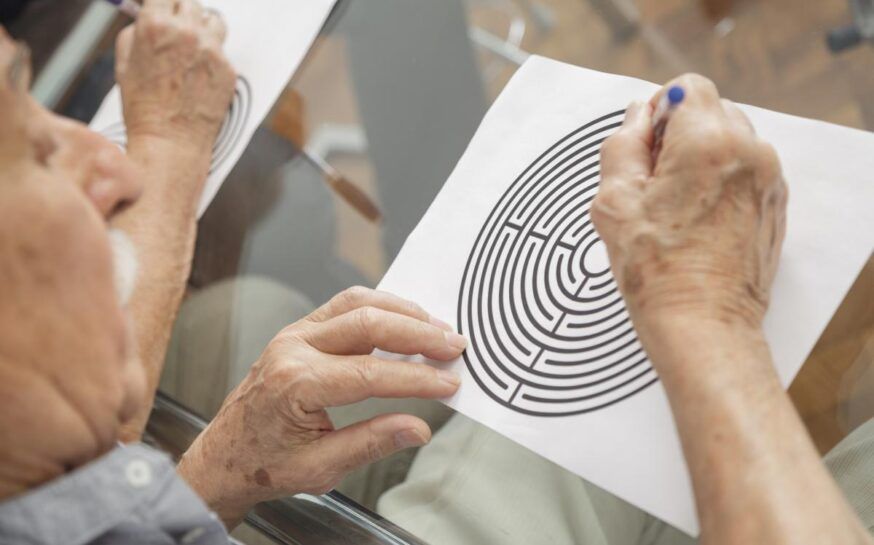Thriving in life involves more than simply getting through the day. It’s about feeling good and acknowledging the gentle moments that make your day special. Things like the warmth of sunlight, a shared laugh, or the comfort of a favorite book can all bring lasting joy. Simple choices, such as enjoying nourishing foods, staying active, and getting enough rest, can help you maintain your vitality. Together, these habits bring quiet joy and comfort to each day.
When these daily habits are paired with simple rituals, such as meditation or drinking a warm cup of herbal tea, they can bring calm and balance to your day. Furthermore, seeking professional care when needed provides additional support to help you stay steady and well. The comforting truth is, it’s never too late. Such small, mindful steps can fill your days with peace, strength, and renewal.
Eating for Joy and Energy
A simple and comforting way to support yourself through each day is by having balanced meals. When you eat mindfully (How Mindful Eating Supports Senior Health and Happiness), it helps you develop a positive relationship with food, rather than just seeing it as a daily routine. This simple approach will help you enjoy nutritious foods your body truly needs, allowing you to stay active and age well.
Nourishing Your Body with the Right Foods
As your body’s needs change over time, adopting a healthier lifestyle in your 60s becomes crucial to maintain energy and resilience. For this, your body relies heavily on certain foods that contain essential vitamins and minerals. This is because nutrient-dense meals contain ingredients that boost vitality and energy. Choosing fresh fruits and vegetables over heavy or processed foods provides essential antioxidants that help protect your immune system and maintain healthy skin and hair. Meanwhile, fiber-rich foods, along with plant-based carbs like legumes, quinoa, and whole grains, help keep your gut healthy and your energy steady through the day. From lean meats to beans and nuts, proteins also play a crucial role in enhancing your muscle and joint health, while keeping each of your meals satisfying and well-balanced.
Drinking Enough Water
Staying hydrated is another important part of feeling nourished. In addition to drinking plain water, you can enjoy a variety of drinks that keep you refreshed and hydrated throughout the day. You can enjoy calming herbal teas or a glass of sparkling water with citrus or cucumber to stay hydrated while bringing gentle moments of comfort.
When your meals are both nourishing and enjoyable, they not only make you feel good inside and out but also provide the steady energy to move with ease and confidence.
Moving with Purpose and Strength
You may often consider movement as an exercise, but in reality, it’s much more than a fitness routine—it’s a form of freedom. A gentle stretch in the morning can help you wake up your tired muscles, while an evening stroll can bring a sense of pleasure and help you sleep better. Sometimes, by taking a deep breath and slowing down for a moment, you become more aware of the little things around you and appreciate them in a much better way. In moments like these, movement feels less like something on a checklist and more like a joyful habit that becomes second nature.
Gentle Exercises to Support Daily Life
As the years pass, strength takes on a new meaning. Instead of lifting heavy weights and chasing numbers, you may start prioritizing small exercises that help you perform everyday tasks with ease. This can range from getting up from a chair without support to keeping your balance while reaching for something on a higher shelf. Such small improvements in mobility and strength may seem simple, but they are powerful wins that build resilience, independence, and flexibility.
Low-Impact Activities for Strength and Balance
Exercises like yoga or tai chi can help you build balance and strength. Even low-intensity activities, such as swimming, cycling, rowing, Pilates, and light aerobics, can help you feel comfortable and safe. From attending group classes at the local community centre to simple stretches at home, there are many fitness activities and exercises for seniors that help you incorporate movement in your day. Regardless of what you choose, it should help you focus on how your body feels with each motion, improve joint flexibility, increase muscle mass, and promote relaxation. Irrespective of the activity, the experience is about feeling at home in your own body, at your own pace.
Movement isn’t just about structured exercise routines—it often comes naturally through simple everyday activities that keep you feeling well and active. It can be something as simple as walking your dog or caring for your garden. Even daily chores like making the bed can keep your body engaged as well as your mind present in the moment. Whether you stay active outdoors or indoors, regular movement gently builds strength, improves mobility, and supports your independence in a fun and enjoyable way.
Sleeping Well to Restore Energy
Just as good food and gentle movement provide your body with the opportunity to restore and renew itself, restful sleep offers the same benefits. Sleep provides your body with quiet space for restoring energy and healing. Simple, calming habits before bedtime can help you drift off more easily, allowing you to wake up feeling refreshed and ready for the day.
Following Evening Rituals
Certain calming habits can gently guide your mind and body to relax, setting the tone for restful sleep. This can be anything from sipping a warm cup of herbal tea to reading your favorite book. These soothing routines signal your body that it’s time to slow down and unwind. Over time, this gentle wind-down helps you drift into deeper, more peaceful sleep each night.
Setting the Right Environment
A restful night begins with a soothing sleep environment that helps you relax. Keeping your room cool, dark, and quiet is one way to do this, as it creates a calm space where your body can relax more easily. Soft bedding enhances your comfort, and small touches—such as a smooth silk pillowcase or a favorite blanket—can make bedtime feel even more welcoming. Together, these details help you drift into deep, peaceful sleep and wake up feeling refreshed.
Getting Enough Sunlight
Your body follows a natural 24-hour rhythm, like an internal clock that regulates your sleep and alert cycles. This rhythm is influenced by light, so getting enough natural sunlight during the day and experiencing darkness at night plays a key role in maintaining good sleep quality. Understanding this connection can help you support better, more refreshing sleep. Gentle movements, such as outdoor walks during the day, can provide the necessary exposure to daylight.
Additionally, avoiding screens like TVs, phones, or other devices for an hour or two before bedtime can help your body ease into a more natural and peaceful rest.
Supporting Your Cognitive Well-Being
Keeping your mind active is as important as taking care of your physical well-being. While it’s natural for cognitive skills to slow down with age, staying emotionally engaged can help keep your mind sharp and focused. Logic games and new learning experiences are great for keeping your brain active and entertained. Moreover, these activities also offer chances to connect with others through shared laughter and fun. When you pair these activities with simple mindfulness practices, they help you clear your mind and bring balance, making each day feel a little brighter and more peaceful.
Challenging Your Brain
You can keep your mind sharp and enjoy a sense of accomplishment by engaging in mind-stimulating activities such as doing sudoku, crosswords, word searches, and logic puzzles, reading books, or learning new skills. Such activities not only challenge your brain but also bring a new perspective, making your thinking clearer and more flexible. They bring fun and purpose to your day while supporting your cognitive well-being.
Building Relationships and Sharing Laughter
Doing puzzles or reading is a wonderful way to keep your mind active, but sharing stories and laughter with friends, family, or neighbors brings a special kind of joy. These social connections not only lift your spirits and make you feel supported, but they also provide important emotional nourishment for your mind. Staying emotionally connected helps reduce stress, boosts your mood, and keeps your brain healthy as you age.
Practicing Mindful Moments
More than just trying brain games and making new connections, certain mindfulness practices can help you refresh your mind. Taking a few minutes each day to practice deep breathing or meditating can help improve focus and clarity. These gentle habits give your brain a natural, calming boost that supports clear thinking and overall cognitive health.
Finding Balance with Holistic Remedies
Combining mindfulness practices with alternative therapies can bring a gentle balance to both your body and mind, supporting your overall holistic health. Even simple activities, such as aromatherapy, can help reduce stress and boost your focus, energy, and overall well-being. For example, during a quiet aromatherapy session, the soothing scent of lavender fills the room, evoking a peaceful feeling that calms your mind. A gentle massage offers similar benefits by relaxing tired muscles and quieting your thoughts. Over time, these small practices can become comforting rituals that encourage you to slow down and care for yourself.
Alternative therapies can be a gentle and helpful way to support your overall well-being. Practices such as yoga, massage, and acupuncture can improve your balance, build strength, promote relaxation, and alleviate discomfort, all while fostering overall well-being and healing. Natural remedies such as herbal supplements or essential oils may help improve sleep and lift your mood, adding another layer of care to help you feel more balanced and refreshed. These approaches combine traditional wisdom with modern health insights, offering a more holistic path to self-care. However, they are meant to complement—not replace—regular medical treatment. It’s always a good idea to talk with your doctor before trying anything new to ensure it’s safe and right for you. When used along with conventional care, these therapies can provide additional support to help you feel your best every day.
Prioritizing Your Well-Being
Taking care of your well-being extends beyond simple lifestyle changes or therapies—it’s about staying engaged and mindful of your health every day. Regular checkups with your doctor are important, not only when you feel unwell, but also to monitor your health and catch small concerns early. Being informed helps you make better choices, while sharing your feelings and working with your doctor allows you to create a care plan that truly fits your needs. Just as important are the everyday steps—paying attention to your body, managing stress, and making time for activities that bring you joy. Together, these habits provide you with balance, confidence, and the opportunity to make the most of each day.
Preparing for Your Doctor Visit
Before heading out for your doctor appointments, make a list of questions you have regarding your health or any changes you’ve noticed in yourself. It helps you remember important things you want to discuss and get clear, helpful answers. Furthermore, it shows your doctor you care and are involved in your care. Proper preparation also makes your appointment feel more organized and less rushed. Being open and clear during the conversation makes it easier to get useful answers. You may also find it helpful to learn about common concerns, such as maintaining bone and joint health, so you feel more prepared and confident when discussing your healthcare needs with your provider.
Keeping in Touch With Your Care Provider
Always contact your healthcare team whenever you feel something isn’t right or if you need any advice. Doing this helps you get timely advice and support. It also gives your doctor a clearer picture of how you’re doing between visits. Regular follow-up can prevent small concerns from becoming larger problems and ensure you feel guided and cared for throughout the process.
Getting Support
Whether it’s a close friend or family member, having someone you trust alongside you makes your wellness journey feel less overwhelming. They can help you stay motivated, accompany you to appointments, remind you of important information, celebrate your progress, and provide a listening ear when you have concerns. This way, these support persons make taking care of your health feel like a shared effort rather than something you have to handle alone.







There are no comments yet